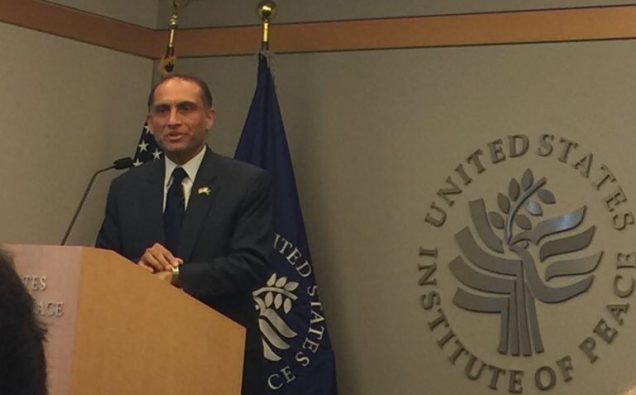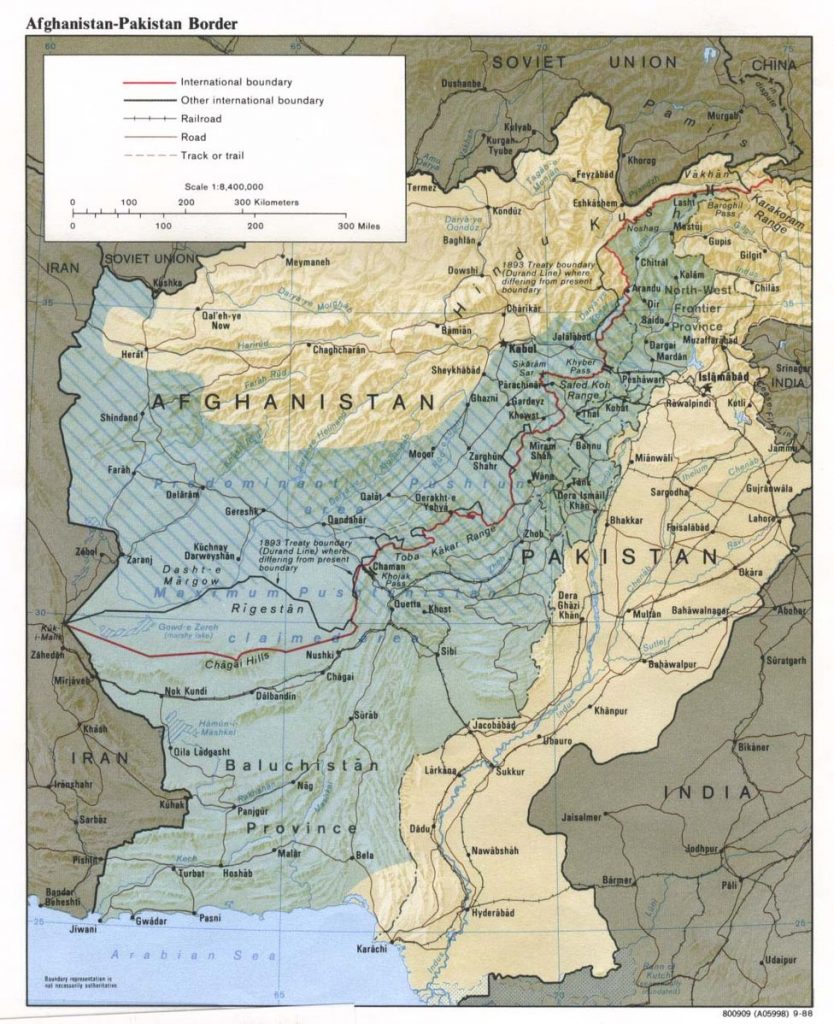
March 29, 2017
Emphasizing that peace in Afghanistan is an “absolute imperative” for Pakistan, Islamabad’s ambassador to the United States has listed five areas of cooperative progress towards the goal for stability in the landlocked western neighboring country.
Ambassador Aizaz Ahmed Chaudhry noted at the U.S. Institute of Peace that based on the Donald Trump administration’s completion of its review and articulation of the U.S. Afghan policy, Islamabad and Washington need to work together.
“Our relationship with the United States is of utmost importance.”
At the same time, Chaudhry also expressed support for any and every effort towards Afghan peace and stability, as new players enter the region. “We believe whatever works, we are ready to work with that.”
The top Pakistani diplomat spoke as Afghanistan continues to remain a dangerous place with a deadly mix of Afghan Taliban insurgency and ISIS or Daesh also operating in the Afghan Khorasan province.According to a U.S. military assessment the number of ISIS fighters in Afghanistan has been reduced to around 700 from a high of around 3000 in recent years. The U.S. still has around 8400 troops in Afghanistan, helping Kabul achieve security in the country 16 years after 9/11 terrorist attacks.
Recently, Moscow has also stepped up efforts to host Afghan peace talks engaging regional countries. Next month, Russia will host a conference of regional countries to which Pakistan has also been invited. Washington has said it would not attend the multinational meeting, as it was not consulted before and does not know its objectives.
Speaking at the USIP, Ambassador Chaudhry acknowledged the United States’ high stakes and role towards Afghan peace. He said initial contacts with the new administration are encouraging, and looked forward to working with Washington on a range of issues.
The search for Afghan peace, he said, needs progress on five tracks including moving away from over-reliance on military operations, improvement in Pakistan-Afghanistan relations, cooperative efforts on effective border management, honorable repatriation of millions of Afghan refugees from Pakistan and progress towards Afghan reconciliation.
Relations between Pakistan and Afghanistan, he said, are critically important to a stable region but unfortunately the current government in Kabul has adopted a hostile policy towards Islamabad. He particularly took issue with the impression that Pakistan is responsible for all ills plaguing Afghanistan, citing some serious governance weaknesses in Afghanistan.
Pakistan and Afghanistan, Aizaz Chaudhry said, need to talk to each other at all levels- political, diplomatic, military and intelligence – in order to move forward. In this respect, he remarked that the recent London meeting between top Pakistani and Afghan advisers was a “step in the right direction.”
On management of the porous and restive Pakistan-Afghanistan border, he said, Islamabad is trying to regulate movement to interdict cross-border movement of terrorists.
“We started working unilaterally on that and hope the Afghan government will come on board on that effort because that is important for them as much as it is important for my country,” he said referring to Islamabad’s heightened efforts to stop illegal entry of individuals.
However, Chaudhry said, border management does not mean stopping or sealing the border.
“This should not be mistaken for that. What we are trying to do is regulate movement for legitimate travelers but not (leave the border) open for terrorists or those with links to terrorism.”
Regarding return of Afghan refugees from Pakistan, where they have lived since 1980s, the ambassador reaffirmed Islamabad’s belief that they should go back to their home honorably and to that effect conducive conditions should be created in Afghanistan.
About the key question of Afghan reconciliation, he said, Pakistan, the United States and China facilitated the Quadrilateral Coordination Group talks process but it did not move forward.
At the end of the day, it is the Afghan government and polity and Afghan groups have to come together to move the reconciliation process forward, he underscored.
Pakistan, he said, envisages the role of a facilitator for itself.
Pakistan has pushed the Taliban and the Haqqanis for talks, he said, but believed there needed to be efforts to create conditions to facilitate negotiated peace in Afghanistan so that the “United States, which has invested so much and for so long in that country is also able to leave with a peace of mind that it has stabilized Afghanistan.”
Categories
Afghanistan-Pakistan tensionsPakistan-Afghanistan Border FenceUS-Pakistan relationsWashington D.C.World
No Comment


















